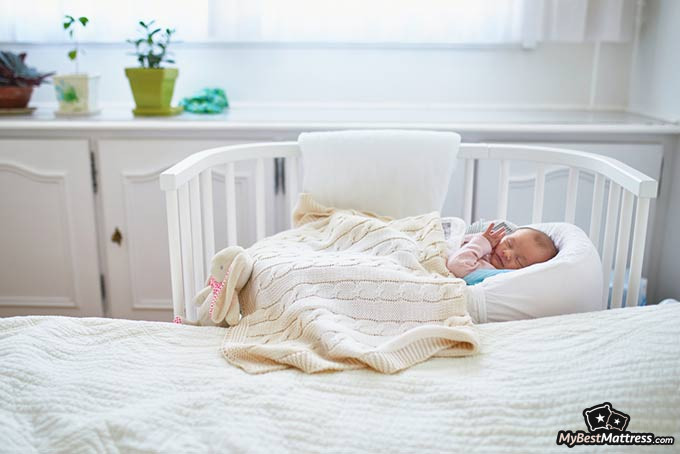
What is the newborn sleep schedule?
How long do newborns sleep?
These are the most common questions asked by the parents-to-be or young mum and dads who are concerned about their newborn sleep schedule. It’s totally normal to be asking these questions, especially if it’s your first child we’re talking about.
In this article, I will provide you with everything there is to know about the newborn sleep schedule, their sleeping habits, and tips, which may be helpful to put your baby to sleep.

What is important to take into account when creating a sleep schedule for newborns?
Parents need to remember that a strict schedule is not possible in the newborn days. This phase of a baby's life is all about laying the right sleep foundations, implementing healthy and age-appropriate sleep education, and starting to introduce simple and daily routines for your new baby. These will all be the basic building blocks to sleep importance as a newborn grows and develops over the coming months.
Table of Contents
- 1. Newborn Sleep Schedule: How much Should Your Baby Sleep?
- 2. Tips to Help Your Baby to Fall Asleep
- 2.1. Use Light Carefully
- 2.2. Don’t Run to Your Baby When He Starts Crying
- 2.3. Create a Routine for Your Baby
- 3. Newborn Sleep Schedule: Tips for New Parents
- 3.1. Choosing the Right Mattress for Your Baby
- 4. The Most Common Baby Sleep Problems
- 5. Conclusions
Newborn Sleep Schedule: How much Should Your Baby Sleep?
When your baby is born, he will need to have a lot of sleep. So don't be surprised to see your baby sleeping almost all day long, waking up for short breaks and then falling asleep once again. That’s just how it works.
Babies until two months tend to sleep for 15-16 hours a day, however, as you probably know, they can wake up crying all the time, so, it doesn’t mean that you will have all of this time to yourself, that would be way too easy.
So, you can expect your baby to sleep at least 8 or 9 hours during the night and have constant naps, which may take from about 7 to 9 hours per day, usually 2 to 4 hours at a time. Therefore, the newborn sleep schedule might seem quite simple, but there’s nothing easy about being a parent.
Remember that during the first half-year, the length of sleep is going to increase[2], while the wakening frequency will reduce.

And never forget that every newborn is different, so, your baby's sleep schedule may be different from your friend’s children or what you've read online. Just make sure to observe your baby, you will notice when it’s time to put him to nap.
Tips to Help Your Baby to Fall Asleep
I already answered your question, how much do newborns sleep. Now it’s time to talk about sleeping difficulties. There’s a tiny chance that your baby will fall asleep quickly every time. So, you need some tips to go with the newborn sleep schedule. But don’t worry, I’ve got you covered.
Use Light Carefully
When it gets dark, the brain produces a sleep hormone called melatonin[1], which signalizes that it’s time to go to rest. So, if you manage to keep your baby’s nights dark and days light, his sleeping cycle should normalize.
During the day, try to allow as much sun into the room as possible, also, go for a walk with your baby and allow him to fall asleep. And, during nap time, your baby should get plenty of light.
If it’s challenging to put your newborn to sleep, you should lower the lights about two hours before putting your baby to bed. It will signalize for the baby that it’s almost time to go to sleep. So, he will have a few hours to get in the mood and should fall asleep much easier.
What is more, if your baby wakes up during the night, you should avoid turning on the light, try to calm him down in the dark. This way, your baby won’t be stressed out by the light, and it will help to stick to the newborn sleep schedule.

Finally, if your baby wakes up very early with the first sun rays, you should make sure to install the room-darkening shades. They should extend your baby’s sleeping time.
Latest Saatva Coupon Found:
UP TO $500 OFF
Limited-time Saatva Sale
We're sharing a limited-time Saatva mattress discount with our readers! Grab this deal & enjoy your new mattress with huge discounts.
Don’t Run to Your Baby When He Starts Crying
It’s a fundamental rule. If you start running to your baby every time he/she starts crying, you don’t give him some time to calm down on his own. So, if you wait a little bit, your baby might manage to fall back asleep, whereas if you run at the exact moment when he has a meltdown, it might be tough to calm him down.
This technique is called the "Cry it Out" method. If you're interested in finding out more, take a look at this guide.

Did you know?
Have you ever wondered which mattresses are approved as the best for sleep?
See & compare TOP mattresses side by sideCreate a Routine for Your Baby
Babies love routine, so if you manage to create it, your life will become so much easier. There are a few simple tricks to improve baby sleep schedule, take a look:
- Pay attention. Always try to observe when your baby gets hungry or want to sleep. Do this every day and very soon you will create a routine that will be just right for your baby.
- Schedule everything. When you make plans, such as doctor appointments, always plan ahead and choose the timing when your baby is the most peaceful.
So, creating a routine will help to maintain the baby sleep schedule and let you plan everything ahead.
Newborn Sleep Schedule: Tips for New Parents
When your baby is born, you will most likely give all your time to focus on the newborn sleep schedule and other important aspects of being a mum or a dad. However, you shouldn’t forget yourself completely. So, here are some tips that will help you to stay sane during the most challenging periods:
- Try to get some sleep. I’ve heard that a lot of people try to sleep when their baby is asleep; however, it doesn’t work for everyone. Since the newborn sleep schedule works so that they go to rest at about 8 p.m., you should try to go with them. Of course, you will still have to wake up a few times during the night, but it would allow you to have some sleep.
- Get out. You should try to get out with your friends, of course, not the very first days but maybe in the first months. It might be difficult to force yourself out of the home, however, once you do it, you will notice the major difference in your self-confidence.
- Join groups. You can always join online communities, to speak to other moms. It will allow you to share your difficulties with others, while others will share their stories with you. Being part of such groups will help to understand that you’re not alone.
- Exercise. When your doctor allows you to have some physical activity, you should begin working out. Just don’t push yourself too hard; it takes time to get back to the body you had before the pregnancy.
- Take care of yourself. While it might seem impossible to find time for yourself, try to find an hour or two to get a new haircut or the message. It will help you to maintain sanity.
Therefore, taking care of your baby should be your number one priority, but even if the newborn sleep schedule takes out everything from you, never forget about yourself - your baby needs strong and healthy parents.
Choosing the Right Mattress for Your Baby
Observing your baby, creating various routines and using tricks to get your baby to sleep are definitely worthy; however, there’s one crucial thing that’s often left out - the right mattress, it might not only affect the newborn sleep schedule but also improve his health.

There’s a variety of mattresses in the market you can choose from; however, new parents can find it challenging to decide which one is the best for their child. But I’ve got you covered, here’s the short information on the mattress types, which are great for your baby:
- Innerspring mattress - this type is the most common for baby cribs. Innerspring mattresses have coils in them, which add extra support. Such mattresses tend to be quite responsive to pressure, not too soft and sleep relatively cool due to the airflow in the coils.
- Foam mattress - these mattresses are best known for their ability to adapt, they offer good comfort. Foam mattresses tend to be inexpensive. However, you should make sure to choose a firmer mattress in order to avoid suffocation and SIDS risk.
- Organic mattress - since organic mattresses are created from all-natural materials, they tend to be more expensive than previous options. There’s a variety of organic mattresses, including innerspring and memory foam. It’s a fantastic option for those whose babies are sensitive, and since other mattresses tend to create off-gassing, organic mattresses are the best way to avoid these gas.
If you are lost among all the options, you can check the list of the best crib mattresses; it will help you to get a general idea and maybe find a fantastic alternative right away.
And here are the mattresses that you should avoid:
- Water beds
- Air mattresses
As these mattresses are very soft and offer zero support for your baby, they can create certain risks, such as suffocation and SIDS.
Thus, you now know, which mattresses you should go for but there are extra measures you should consider when choosing each of them. Here they are:
- Certification - when you choose the new mattress, always check if it meets the standards of the U.S Consumer Product Safety Commission (CPSC) and American Society for Testing and Materials(ASTM) safety standards. That way, you will know that you’re making the right choice for your baby.
- Firmness. You do understand that newborns cannot adjust to their sleeping position, so by putting them on the soft surface, you can create certain dangers, such as suffocation and SIDS. Therefore, make sure to choose a firmer mattress, the one that wouldn’t make your baby feel like sleeping in the mattress. What is more, even sleeping with your baby can lead to higher risks of SIDS[3].
- The size. Make sure that when you put the mattress into the baby’s crib, there are no empty spaces left on the side.
- Breathability. You wouldn’t want your baby to sleep hot, so make sure that the mattress is breathable. In this case, the best option is innerspring mattresses, which let the airflow through the coils.
- Water-resistant covering. It would be so much easier to protect the mattress from the damaging and bacteria if you would choose the waterproof covering. Since not all of the beds might have those options, you should buy the extra cover that would fit your mattress.
So, by now, you know a lot about a newborn’s sleep. I already answered your question, how much do newborns sleep, you already know the tips and tricks to put your baby to sleep, which mattress to choose, and where to look for it. As all of these steps are behind you, I would like to focus on another issue, which is the last point in this article - baby sleep problems.
The Most Common Baby Sleep Problems

It’s not the same as asking how long do newborns sleep; however, baby sleep problems are even more critical for newborn sleep schedule. I’m not going to talk about clinical diseases, as if there are any serious problems, you should go to the doctor right away. On the contrary, I want to introduce you to the issues that you can solve by yourself as a parent:
- Your baby’s internal clock is out of sync. I already talked about creating the routine in this article, so it’s the same. If your baby finds it difficult to sleep at night, you should make sure to acquire specific habits, such as going to sleep every night at the same time or turning off the lights a few hours before going to sleep. It will help your baby to adapt, and he will get used to the regime.
- Your baby is hungry. When your baby is very small, there’s not a lot you can do but to regularly feed him. The only tip is to feed your baby without waking him up. It’s called dream feeding.
- Your baby is not prepared to sleep. Make sure to set the mood a few hours before your baby is getting to sleep. The easiest way to do that is to minimize the lights.
- Your baby is napping too late in the afternoon. It’s normal that if your baby just woke up from a few hours nap, he wouldn’t want to go to sleep so soon again. What you can do is to shorten the time of the last nap he takes before going to sleep.
These are the main baby sleep problems to consider before focusing on how long do newborns sleep. So, if you follow these rules, you are likely to avoid the most common difficulties.
Conclusions
As promised in the very beginning of this article, I answered your question, how much do newborns sleep. So, now you know that newborns usually sleep from 15 to 16 hours a day, including 8 to 9 hours of the night sleep and 7 to 9 hours of nap time.
As simple as it sounds, you expect your baby to wake up very frequently and of course during the night. But use the techniques that I’ve told you, such as creating a routine for your baby, using light carefully, allowing baby to calm down on his own. It could create significant changes.
While taking care of your baby, never forget about yourself, try to have some of your personal time. And, if your baby keeps waking up during the night, make sure he sleeps on the comfortable mattress, check out the best cribs to find the right option.
That's about it, I hope this article was informative and helpful for expecting and new parents.
Contributed By Kelley Thompson, Certified Pediatric Sleep Consultant
Kelley Thompson, the owner of Serenity Sleepers, is a certified pediatric sleep consultant, who has been helping families all over the world for more than 5 years to safe, healthy, and proper sleep...
Read Full Bio...Scientific References
Contributed by Kelley Thompson, Certified Pediatric Sleep Consultant1. Sylvie Tordjman, Sylvie Chokron, Richard Delorme, et al.: 'Melatonin: Pharmacology, Functions and Therapeutic Benefits'
2. Ni Jian and Douglas M. Teti: 'Emotional availability at bedtime, infant temperament, and infant sleep development from 1 to 6 months'
3. Per Möllborg, Göran Wennergren, Petra Almqvist, et al.: 'Bed sharing is more common in sudden infant death syndrome than in explained sudden unexpected deaths in infancy'
Leave your honest feedback
Leave your genuine opinion & help thousands of people to choose the best mattress. All feedback, either positive or negative, are accepted as long as they’re honest. We do not publish biased feedback or spam. So if you want to share your experience, opinion or give advice - the scene is yours!














